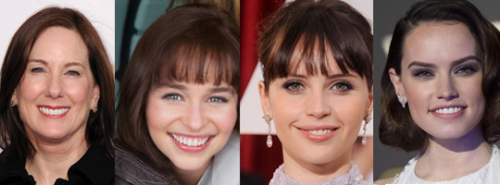Prime Clone
Super Freak
they tend to become "centrists" when they get tired of all this BS
Yes, the extremists on both sides tend to turn on their own if they aren't extreme enough. Everything else looks too Right or Left if you're on the extremes.

they tend to become "centrists" when they get tired of all this BS
There's a 1.35GB/1.42GB copy of the film out now (categorized as HDTC720P). The picture's a lot better and it has the opening crawl.
Now you can go and check the things you might've missed in the cinema more easily.


Ugh - as if the film industry wasn't already collapsing under the weight of Netflix, remakes/reboots/sequels and the internet/smartphone. Now it's bit torrent to the rescue.
if you're gonna dislike TLJ, at least pay to see it at a theater, and if you must, buy a ticket to something else and go into TLJ.
From an offended female reviewer.
What's interesting is if it was one of the three characters you mentioned we as the audience would probably have very specific assumptions as to who they were talking about when telling Poe "I know your kind; impulsive, dangerous and exactly what we don't need right now."
If Ackbar said it we could assume he was saying "we don't need a crazy ROTJ Lando right now."
If Lando said it we could assume he meant "we don't need a crazy Han Solo right now."
And Mon Mothma would have us assuming she meant "we don't need a crazy Jyn Erso right now."
It definitely would have been cool to have that extra layer of context to the dialogue. That said I still am fine with Dern's portrayal of Holdo and the fact that she was a brand new character. But yeah it definitely would have been cool to see how it would have played with someone else as well.
Official concept art right there.
Yeah, I was honestly caught off-guard when the movie expected us to be sad at her staying behind to pilot the ship.
The soldier who tastes the salt just to make sure the audience know it's not not-Hoth.
.

Actually, this was probably needed; you have to remember, it was "casual fans" who were saddened that Felicity Jones was playing Rey when RO trailers first came out.

Actually, this was probably needed; you have to remember, it was "casual fans" who were saddened that Felicity Jones was playing Rey when RO trailers first came out.

I wonder why?

Buying five of these! Memorabilia of the ruination of Star Wars is gonna be worth a **** ton!

Those aren’t necessarily fans either. They just happen to like Star Wars enough to see the films once, after they’re released and then they move on. When I think of a fan, even a casual one, I think of someone who’s willing to delve into the world beyond the mere scope of simply passing the time.Actually, this was probably needed; you have to remember, it was "casual fans" who were saddened that Felicity Jones was playing Rey when RO trailers first came out.
Dear lord, the hotness! Always nice to see Emilia on screen! Can’t wait!I wonder why?

I wonder why?

Add grace, remove kathleen and that will be my new sig, somebody please!!!

